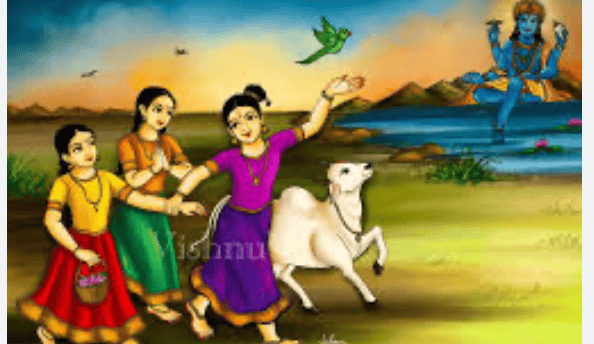Vedanta
Thiruppavai Pasuram
Thiruppavai, composed by the great Tamil saint-poetess Andal, is one of the most cherished devotional hymns in the Vaishnavite tradition. It is a collection of 30 verses (Pasurams), each representing an aspect of devotion to Lord Vishnu, particularly in His incarnation as Lord Krishna. The hymns of Thiruppavai, sung especially during the Tamil month of Margazhi (December–January), are filled with divine love, surrender, and intense devotion.
Madhavi
12/16/20243 min read


The First Pasuram: A Call to Wakefulness and Devotion
The first verse of Thiruppavai serves as an invitation to all beings to awaken spiritually, embrace the divine presence of Lord Vishnu, and live a life of purity and righteousness. It is both a hymn and a call to action, urging us to rise above the mundane distractions of daily life and focus on spiritual progress.
Pasuram 1:
"ஊர்மேல் யாவரும் விளம்பி உயிருடன்
கூறும் ஓசை நின்று குழலாடும்
நாய்களும் கோயிலில் பாட்டாளி சிறகு
சூழும் பாரதி சூழும் பாரதி
உள்ளம் முழுதும் வழிபாடு உதயவள்ளி."
Transliteration:
"Oor-mel yaavrum vilambi uyirudan
Koorum osai ninru kuzhalaadum
Naaykalum koyilil paattali siragu
Sozhum paarathi sozhum paarathi
Ullam muzudhum vazhipaadhu udaiyavalli."
Meaning:
This verse is an appeal to all living beings to join in the divine worship of Lord Vishnu. Andal begins with a description of a perfect spiritual environment: "Oor-mel" (all over the village) signifies the reach of divine sound, and "yaavrum vilambi" means everyone is participating with enthusiasm. "Uyirudan" (with life) indicates the sincerity and wholeheartedness with which the devotion is expressed.
Andal paints a vivid picture of the morning rituals when the village comes alive with the sounds of devotion. The "koorum osai" (the sound of the conch) and "kuzhalaadum" (the sound of the flute) signify the auspicious and divine atmosphere that envelops the devotees as they engage in worship.
She also mentions the presence of "nayaykalum" (dogs) around the temple. This inclusion shows that devotion is not confined to human beings alone but extends to all living creatures. It is a universal call for all beings to engage in worship.
The final lines — "Sozhum paarathi" and "vazhipaadhu udaiyavalli" — are an invitation to meditate upon Lord Vishnu in every aspect of life, allowing the heart to be full of devotion. Udaiyavalli here refers to the Goddess Lakshmi, who is always with Lord Vishnu, guiding the devotee towards the ultimate spiritual goal.
Key Themes in the First Pasuram
1. Universal Devotion:
Andal, in this opening verse, sets the tone for the entire work by calling all creatures — human and non-human — to partake in divine worship. By referring to "nayaykal" (dogs) in the temple, Andal emphasizes that devotion does not discriminate based on species. It is available for all beings, and it is through this inclusive devotion that the heart is purified.
2. Awakening the Heart:
The invocation begins with the idea of waking up and engaging in the divine activity. The morning rituals, with the sounds of the conch and flute, symbolize the call to spiritual awakening. Andal calls upon the devotees to be active participants in worship, aligning their hearts and minds with the divine.
3. The Role of Sound in Devotion:
The "koorum osai" (the sound) and "kuzhalaadum" (the flute) represent not just external sounds but the internal harmony that devotion brings to the soul. The conch and flute are often seen as symbols of the divine, and in this context, they signify the awakening of the inner consciousness, drawing one’s mind towards Lord Vishnu.
4. Purity of Heart:
The ultimate purpose of devotion, as expressed in Andal’s first verse, is to allow the heart to be filled with pure love for the Lord. Through constant and sincere worship, the devotee’s heart becomes a temple where Lord Vishnu resides. In this sense, the body becomes a vehicle for divine grace.
The Significance of Thiruppavai
Thiruppavai is more than just a collection of hymns; it is a spiritual journey. Through these verses, Andal narrates her intense longing and devotion towards Lord Vishnu, portraying the path of bhakti (devotion) as a journey of surrender, purity, and love. Each Pasuram addresses a different aspect of spiritual life — from the importance of community worship to the significance of personal devotion.
The first Pasuram, in particular, sets the tone for this journey, emphasizing the need for collective awakening and participation in spiritual practices. Andal’s call to “rise and join in the worship” is as relevant today as it was in the ancient past. In our fast-paced, often distracted world, the message of Thiruppavai resonates deeply — to take time to reconnect with the divine, to purify our hearts, and to engage in selfless worship.
Conclusion
The first verse of Thiruppavai is a powerful reminder to live with a sense of devotion and purpose. It calls on all beings to wake up from their slumber, to rise above their earthly distractions, and to engage in the worship of Lord Vishnu with sincerity and joy. Through Andal’s words, we understand that true devotion is not limited by time, space, or species; it is a universal call for the upliftment of all. As we recite each verse of Thiruppavai in the days of Margazhi, we are invited to internalize this call to devotion and bring it into our lives, creating a sacred space in our hearts where divine love can dwell.
Let us embrace this journey of devotion, following Andal’s footsteps, and allowing the divine presence to guide us in our spiritual awakening.
